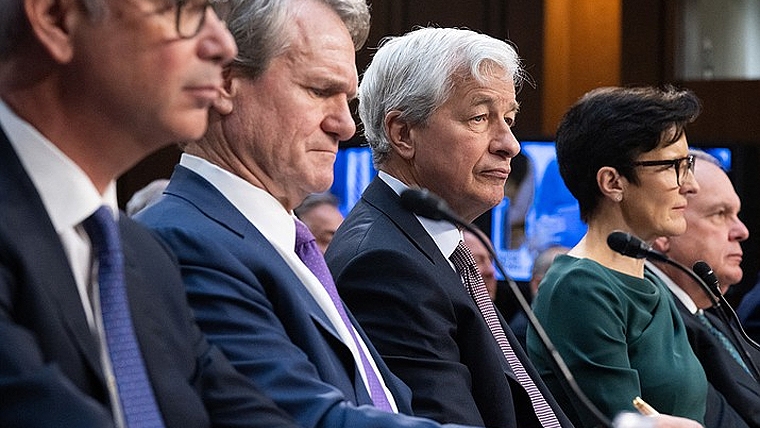
In December, the CEOs of the eight largest banks in the United States participated in a three-hour posturing session before the Senate Banking Committee. It was a disheartening display that showcased the toxic blend of politics and asinine rhetoric that often characterises discussions about banking.
Much of the hearing focused on proposed banking regulations known as the “Basel 3 Endgame.” Claiming to “translate” the potential implications of this complex topic “for the average American,” Republican Senator Tim Scott stated that the proposed rules would lead to “fewer dollars to lend to Americans.” Bankers and several senators, including Scott, argued that by keeping a portion of the banks’ money “on the sidelines,” these regulations would prevent poor people from achieving the American Dream.
But these threats often originate from falsehoods, such as Scott’s suggestion that capital is something banks cannot use. In reality, as Democratic Senator Sherrod Brown noted, “Absolutely nothing in these rules would stop banks from making loans.” Instead, they would simply require banks to rely more on their own equity and less on borrowing to finance loans and investments. As the late US Federal Reserve Chair Paul Volcker famously observed, there is a lot of “bullshit” in the debate about capital requirements.
Prudent banks insist on borrowers having “skin in the game” when they lend, yet vehemently oppose regulations aimed at reducing their dangerous reliance on borrowing. Banks’ aversion to equity funding and addiction to borrowing enables them to shift costs and risks to others, ultimately benefiting at public expense. They often get away with it by keeping politicians and the public confused.
Shortly after the 2007-09 financial crisis, I realised that crucial policy decisions were being influenced by nonsensical analysis, impenetrable jargon, fallacious and misleading arguments, and inappropriate uses of mathematical models. As a result, opportunities to improve the banking system were constantly overlooked. By sowing confusion and leveraging their influence over politicians, regulators, lawyers, and economists, bankers have corrupted the mechanisms by which rules are formulated and enforced.
The 133,000-word “Basel 3 Endgame” adjusts a complex system of “risk weights” by trying to calibrate the rules. Banks have weaponised the complexity of the proposed rules, threatening to reject certain loans. In fact, with the debt subsidies we all provide them, they will take risks, chase outsize returns, and endanger us.
Over the past 14 years, I have consistently challenged the fallacies, irrelevant facts, and myths propagated by numerous bankers, policymakers, and economists. In November 2010, I helped organise a letter by 20 banking and finance scholars warning that the proposed Basel 3 reforms were grossly inadequate. I also debunked JPMorgan Chase CEO Jamie Dimon’s misleading claims about the Basel 3 rules in an open letter to the JPMorgan Chase board of directors and criticised Dimon for implying that what benefits large banks automatically benefits America.
Recognising the importance of countering bankers’ obfuscation, the German economist Martin Hellwig and I published the book The Bankers’ New Clothes: What’s Wrong with Banking and What to Do about It in 2013. Our goal was to expose how and why banks are so needlessly dangerous and to propose ways to change the system that merely required political will. But the symbiotic relationship between banks, governments, and parts of the media and academia ultimately prevailed. As Democratic Senator Richard Durbin said in 2009, banks “own” Capitol Hill.
More than a decade later, JPMorgan Chase has grown much larger, its deposits having more than doubled from $1.1 trillion in December 2011 to nearly $2.5 trillion in December 2023, far outstripping its reported loans, which increased from $700 billion in 2011 to $1.3 trillion in 2023. The bank’s reported assets of about $3.4 trillion, stacked as dollar bills, would extend over 230,000 miles into space – almost as far as the moon.
While the runs on Silicon Valley Bank and First Republic Bank in the spring of 2023 reflected legitimate concerns regarding their asset values and solvency, flawed accounting rules and Fed support continue to obscure the fragility of other banks. The persistence of bailouts is costly for society and encourages a culture of recklessness, both in the US and abroad.
The March 2023 collapse of Credit Suisse is a prime example of the disruption caused by the failure of financial institutions that operate across multiple jurisdictions. It is doubtful that maintaining such large institutions is justifiable, given the costs and risks they pose to our societies. Moreover, the preferential treatment of banks has fostered widespread disregard for rules, encouraging criminal behaviour that often goes unpunished.
Political forces and misinformation continue to distort policy decisions. In a new and expanded edition of our book, Hellwig and I explore the severe governance issues that plague the banking sector and undermine our democracies. One notable example is the $13 billion settlement JPMorgan Chase agreed to in late 2013 to avoid a trial that would have revealed damning details of fraud committed by the bank’s employees under Dimon’s leadership.
While Dimon correctly asserts that banking rules are excessively complex, he also vehemently opposes simpler regulations. But by designing and implementing such rules effectively, policymakers could reduce the need for costlier regulations and yield significant social benefits at virtually no cost.
If banks are unattractive to equity investors, it may be due to their perceived opacity, or because banking has become too dependent on debt subsidies, which would be lost if financial institutions used equity funding. Blanket subsidies to profit-maximising banks, however, make little sense. Instead, public funds should be directed toward deserving causes and those most in need of support.
The inability of our democracies to resist the influence of powerful corporations and their leaders is alarming, given that this ongoing failure fuels legitimate discontent with our economic, political, and legal systems. Deception (possibly self-deception) is prevalent not only in banking but across numerous other industries as well.
Based on misleading and disingenuous threats, banks have lobbied furiously and mobilised citizens and politicians to object to the proposed rules. On January 16, 2024, the deadline for public comments, I submitted my reaction to the Basel 3 Endgame proposal, as well as another related and misguided one. I attached a document debunking 44 flawed claims, which my co-author and I continue to revise as we identify more such claims. In the politics of banking, I fear that willful blindness to truth is likely to prevent better rules.
Anat R. Admati, Professor of Finance and Economics at the Stanford Graduate School of Business, is co-author (with Martin Hellwig) of The Bankers’ New Clothes: What’s Wrong with Banking and What to Do about It – New and Expanded Edition (Princeton University Press, 2024). Copyright: Project Syndicate, 2024, published here with permission.
3 Comments
And here, we are dominated by just 4 foreign owned banks who take some $7bn in dividends out of the country each year. Of course we need banks, just not the ones we have; the model is not fit for purpose.
As the American economist Irving Fisher argued a long time ago in 100% Money, " The checking deposit department of the bank would become a mere storage warehouse for bearer money belonging to its depositors and would be given a separate corporate existence as a Check Bank. Deposits would be fully backed. Other banks could do everything else banks do, but be free to fail with no bailout.
I suspect that with just a small number of changes this article would be true for NZ banks too. It is good to see someone trying to rein them in. Now how do we get the politicians to listen?
100% agree with this.
How do the big banks get away with it?
"Banks have weaponised the complexity of [any new] rules". Sums it up nicely.
You simply can not expect politicians to understand the issues. Nor the media. And amongst non-bank economists there are few.
So it's left to a small number of relatively poorly paid non-bank economists that specialize in banking economics to argue down the nonsense the big banks' highly paid economists will use (even though - and I know this for a fact - they themselves know they're talking total b.s.)
Totally rigged by big money.

We welcome your comments below. If you are not already registered, please register to comment
Remember we welcome robust, respectful and insightful debate. We don't welcome abusive or defamatory comments and will de-register those repeatedly making such comments. Our current comment policy is here.